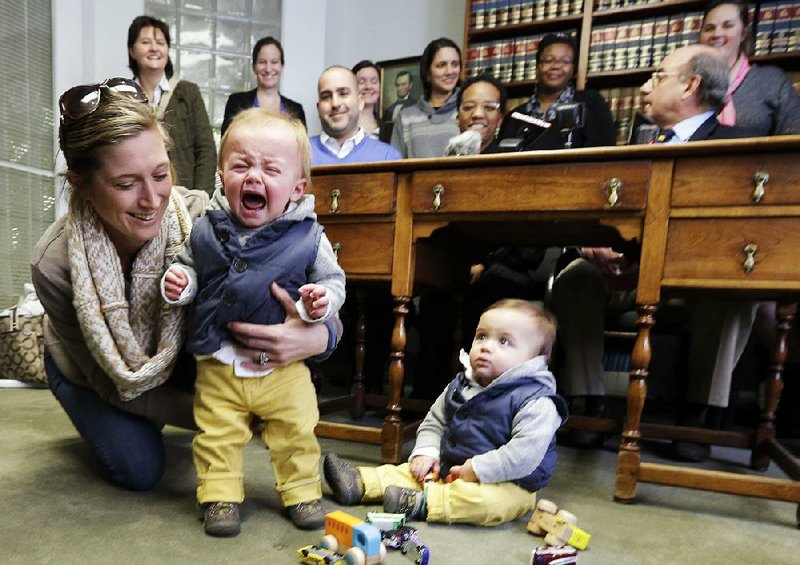CINCINNATI - Four legally married gay couples filed a federal civil-rights lawsuit Monday seeking a court order to force Ohio to recognize same-sex marriages on birth certificates despite a statewide ban, echoing arguments in a similar successful lawsuit concerning death certificates.
The couples filed the suit in federal court in Cincinnati, arguing that the state’s practice of listing only one partner in a gay marriage as a parent on birth certificates violates the U.S. Constitution.
“We want to be afforded the same benefits and rights as every other citizen of the United States,” said one of the plaintiffs, Joe Vitale, 45, who lives in Manhattan with his husband and their adopted 10-month old son, who was born in Ohio. The pair married in 2011 shortly after New York legalized gay marriage.
A spokesman for Ohio Attorney General Mike DeWine, whose office will fight the lawsuit, declined to comment.
Previously, DeWine, a Republican, has said he has a duty to defend Ohio’s constitution and statutes, including the statewide ban on gay marriage, passed overwhelmingly by voters in 2004. Gay-marriage supporters are working to put the issue back on the Ohio ballot in November.
The other plaintiffs in the lawsuit are three lesbian couples living in the Cincinnati area who married in states that have legalized gay marriage. One woman in each of those marriages is pregnant through artificial insemination.
The couples say they’re worried that having only one of them listed as a parent on their children’s birth certificates could lead to problems down the road, such as a denial of parental rights to the one not named should her partner die or experience a medical emergency.
“I have no legal grounds to stand on. That’s not something that should be happening in our society,” said Pam Yorksmith, who married her wife in California in 2008. The couple has a 3-year-old son and another on the way.
The couples are being represented by Cincinnati civil-rights attorney Al Gerhardstein, who represented two gay married couples in their lawsuit last year that successfully sought a court order forcing Ohio to recognize same-sex marriages on death certificates. The state is appealing the ruling, issued in December by federal Judge Timothy Black.
Unlike in Oklahoma and Utah, where federal judges recently struck down gay-marriage bans, Gerhardstein is working to slowly chip away at Ohio’s ban through narrow lawsuits.
He referred to the Cincinnati-based 6th U.S. Circuit Court of Appeals, saying he didn’t think its judges would uphold a ruling similar to the Oklahoma and Utah cases but would be more open to the argument he’s making - that a state cannot disavow a marriage that was legal in the state where it took place.
Gerhardstein’s tactic also will give the U.S. Supreme Court a wider variety of legal arguments to consider when appeals from various states reach its chambers.
Elsewhere on Monday, Nevada’s Democratic attorney general said she won’t defend the state’s gay-marriage ban when it goes before a federal appeals court.
Attorney General Catherine Cortez Masto, in a motion filed with the 9th U.S. Circuit Court of Appeals, said Nevada’s legal arguments aren’t viable after the court’s recent ruling that potential jurors cannot be removed from a trial during jury selection solely because of sexual orientation.
The ruling extended to gays and lesbians a civil right that the U.S. Supreme Court has previously promised only to women and racial minority groups.
“After thoughtful review and analysis, the state has determined that its arguments grounded upon equal protection and due process are no longer sustainable,” Masto said in a statement.
Information for this article was contributed by Sandra Chereb, Brady McCombs and Hannah Dreier of The Associated Press.
Front Section, Pages 4 on 02/11/2014

